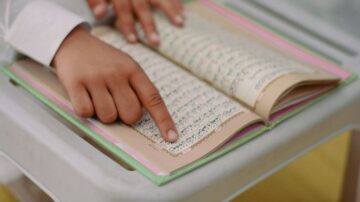If you ask any Muslim, regardless of his or her age, education, or background, about the first and foremost feature that distinguishes Ramadan, you will most likely get one answer: “It’s the month of the Qur’an.” This is no wonder. The only one time Ramadan was mentioned throughout the Qur’an, it was associated particularly with the revelation of the Qur’an:
(The month of Ramadan in which was revealed the Qur’an, a guidance for humankind, and clear proofs of the guidance, and the Criterion (of right and wrong)) (Al-Baqarah 2:185)
Besides, the Qur’an also emphasizes in more than one verse that it was revealed in the Night of the Decree (Laylat Al-Qadr), the crown jewel of the month of Ramadan.
Many Muslims realize this fact. Therefore, once Ramadan approaches, it is common practice among Muslims to dust off their copies of the Qur’an and to compete with one another in reciting the Qur’an and in completing it as many times as possible. Furthermore, worshippers in many mosques around the world are keen on completing the Qur’an at least once in the Tarawih Prayers. In brief, Ramadan is the month of celebrating the Qur’an par excellence.
But are Muslims truly aware of the treasures abundant in the Qur’an? Those who are keen to do as many khatmahs (full recitations of the Qur’an) as possible, are they equally keen on grasping the sublime message of the Qur’an and on putting it into effect in their lives, the private and public alike?
The month of Ramadan comes and goes, and Muslims do read the Qur’an in the blessed month. Yet, has the Ummah changed for the better? Has this competition in reciting the Qur’an on the Muslims’ part yielded an improvement of Muslims’ behavior, progress, and position among the world’s nations?
Furthermore, Muslims now have millions of copies of the Qur’an, a number that certainly was not available to Prophet Muhammad’s Companions and early generations of Muslims. However, unlike us, they led the world.
Clearly, there is a problem in our approach toward the Qur’an. Many Muslims opt for the easiest choice, being content with just reading the Qur’an without any reflection or attempt to apply the Qur’an’s teachings. True, reciting the Qur’an is a good, rewarding act of worship, yet it is not everything. It is merely a means of receiving and, afterwards, activating the provisions of the Qur’an. Without understanding this fact, the Muslim Ummah will not move a step forward.
This Ramadan is a chance for each of us to review and improve the way he or she interacts with the Qur’an. Let’s make this blessed month the starting point for a totally different experience with the Qur’an. We have to stop thinking of the Qur’an as a text we read merely to get the reward of reading. Rather, we should approach the Qur’an having the full conviction that it is the guide, the manual set by Allah for us to lead a happy life in both this world and the Hereafter. In addition to recitation, extra effort is required in reflection and application. Reading in itself is not the ultimate goal of sending down the Qur’an; it would not avail a student to just repeat his textbooks without any understanding and practice.
Of course this would take more time from us, and many of us would find it difficult to resist the temptation of reading more passages without concentration. Yet it is the only way to let the Qur’an have its touch on our hearts and make a real change in our life.
The fact that we are in the month of Ramadan can be very helpful in this regard. It would be a good idea to keep a notebook for recording short reflections on the parts we read every day. Another notebook can be reserved for recording the commands of the Qur’an that we need to activate in our life. From time to time, we would check the list of these commands and assess our progress in following them. With the passage of time, this will turn into a habit and get much easier, helping us to be always connected to the Qur’an.
By Muhamamd Fathi

